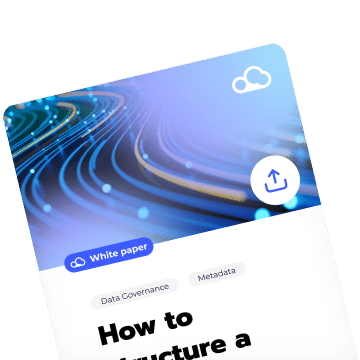Data Governance Managers perform many roles within an organization: They steer compliance strategies, protect data, monitor compliance regulation, extract value from data, and drive companies into the data-driven future.
However, the role of the Data Governance Manager is indispensable above and beyond data governance. Their expertise aids the organization in navigating the complexities of their data environment and is vital for organizations using their data to drive growth and success.
In this blog, we’ll dive into the role of Data Governance Managers and uncover their main responsibilities, provide best practices for current and future Data Governance Managers, and discuss the potential future roles of these essential organizational governance guardians.
The dynamic roles of Data Governance Managers
Extracting valuable insights from data presents many quality, privacy, and compliance challenges. Data Governance Managers are the guideposts for organizations managing these complexities.
The primary roles that a Data Governance Manager serves in their organization include:
-
- Protector of data privacy: Safeguarding data privacy is the primary responsibility of Data Governance Managers. They ensure compliance with regulations and company policy on data use and access.
- Champion of data integrity: Data Governance Managers establish and sustain high data integrity standards. They ensure that all company data is clean, consistent, and trustworthy.
-
- Facilitator of collaboration: Data Governance Managers lead collaboration on all data-related issues between business units. They are vital in aligning diverse data objectives and methodologies for potentially competing domains. This is especially critical as data moves across and through various business verticals.
The core responsibilities of Data Governance Managers
Data Governance Managers carry many daily roles and responsibilities. Some of their primary functions include:
- Define and implement data governance strategies: Data Governance Managers’ principal function is to develop governance strategies to protect company data from unauthorized use. This includes ensuring data handling and use comply with various regulatory standards throughout its lifecycle. Data Governance Managers’ strategies to protect data include company policies, technical standards, and handling procedures.
- Oversee data quality and lifecycle management: Data Governance Managers are responsible for handling, maintaining, and monitoring the quality of data and the lifecycle of that data within an organization.
- Data quality: Ensuring that the data an organization collects, stores, processes, and uses is accurate, consistent, reliable, and relevant.
- Lifecycle management: Data’s lifecycle begins from creation or acquisition and extends through storage, use, archiving, and eventually, deletion or disposal
- Maintain regulatory compliance: Assuring compliance with strict data protection regulations like GDPR and CCPA is no small task: Data Governance Managers must stay current with new and existing rules and update data policies and practices as needed.
- Elevate data awareness: Data Governance Managers provide educational support to everyone using company data: They create and maintain a culture of data awareness and security through training to build data literacy company-wide.
- Lead crisis management: The Data Governance Manager protects the organization from risk by leading the company’s crisis response to data breaches and other data-related incidents.
- Oversee vendor and third-party data sharing: Data Governance Managers regulate data sharing with clients, vendors, and partners. They oversee third-party vendors, tools, and services to ensure they align with all data governance policies.
- Recommend budgets: Data Governance Managers oversee budgeting for data governance initiatives in many organizations. This funding may include software, training, and staff budgets to ensure cost-effective, value-driven outcomes.
The role of a Data Governance Manager is multifaceted and dynamic. It’s unsurprising, given that they are the stewards of company data and the engineers of a data-driven culture. Consequently, their overarching role is to ensure that data remains an asset, not a liability.
Consequently, their overarching role is to ensure that data remains an asset, not a liability.
Essential best practices for Data Governance Managers
For companies afloat on an ocean of data, the Data Governance Manager becomes the navigator, keeping compliance on course while charting a heading toward quality. There are several best practices for Data Governance Managers to achieve optimal outcomes for both data and the organization:
Craft a Comprehensive Governance Framework: The top priority for Data Governance Managers is to design a detailed and robust data governance structure. This structure should:
- Clearly outline the policies that dictate how data is used and accessed
- Specify the procedures and step-by-step methods to handle data safely and efficiently
- Set standards, and benchmarks or criteria for data quality and management
- Achieve uniformity in organizational handling of data so that all teams are aligned and consistent in their practices
Re-emphasize Data Security: In an era of increasing cyber risk, safeguarding data is critical. Data Governance Managers protect data by:
- Maintaining current security protocols to counteract the latest threats
- Performing frequent vulnerability checks to identify and fix potential security gaps
- Cultivating a data security culture where everyone values and practices data protection measures
Maintain Open Dialogue: Encourage and promote an environment where IT teams, Business Intelligence, and other stakeholders regularly interact.
- Hold regular discussions and feedback sessions to help harmonize data goals
- Build a unified approach to identify and address data-related concerns and opportunities
Stay Informed: Data Governance Managers must remain ahead of the curve in a constantly shifting data landscape. They should be:
- Keeping current with data regulations and protocols
- Staying informed on the latest in tech tools and platforms
- Monitoring and adopting best practices and newly emerging methods
Build Data Literacy: Champion the importance of business information throughout the organization. It’s essential that they:
- Provide routine training to employees to build the proper data skills
- Offer hands-on learning experiences for a deeper grasp of data concepts
- Be accessible to discuss and explain company governance policies, standards, and practices
Implement Regular Audits: Scrutinize all data processes to maintain the highest data-handling and use standards. Data Governance Managers should regularly conduct audits to:
- Spot inconsistencies or weak links in data handling
- Understand areas requiring enhancement or refinement
- Verify that all data activities align with governance policies and standards
Embrace Technology: Lean into the benefits of modern data governance tools. By doing so, Data Governance Managers can:
- Streamline data-related responsibilities
- Reduce manual efforts and enhance efficiency
- Gain insights through data-driven analytics, informing and refining decision-making
Effective Data Governance Managers use these best practices to optimize their organization’s information and support the creation of quality insights that lead to innovation and informed decision-making.
The evolving role of Data Governance Managers: What’s next?
The role of the Data Governance Manager is on the brink of significant transformation. As data governance grows beyond compliance, Manager roles will likely take on new and challenging dimensions. These new dimensions may include:
- Emergence of advanced technologies: Incorporating AI and machine learning into everyday business processes comes with challenges. Not only must Data Governance Managers understand these technologies, but they will be expected to leverage them. Data Governance Managers will be central in guiding these new technologies’ use in data policy and regulatory compliance.
- Bridging the technical and strategic gap: Beyond managing data, Data Governance Managers must fuse technical knowledge with strategic vision, identifying future data trends and anticipating regulatory changes. In the future, Data Governance Managers will be increasingly involved in determining organizational strategies and initiatives.
- Ethical data usage: Conversations regarding the ethical use of data are fast gaining traction. And Data Governance Data Governance Managers will be at the forefront of these discussions as firmer concepts take shape. Data Governance Managers must create and revise data policies to respect these new consumer rights and privacy regulations.
- Championing data literacy: The role of the Data Governance Managers will continue to support a company-wide understanding of data. They will craft a new culture where all employees, from entry-level to C-suite, realize the value and importance of the data they handle.
- Strategic leadership: Data Governance Managers will emerge as pivotal thought leaders moving beyond merely data custodians. Their insights will shape boardroom decisions, product innovations, and perhaps even organizational development as data becomes increasingly the most prized asset.
Leading the data-driven revolution
The Data Governance Manager’s role will only become more influential as reliance on data for strategy increases. Their expertise will guide organizations over the tumultuous sea of business information, and their commitment to data quality, privacy, and integrity will be pivotal for businesses to thrive in this environment.
By embracing best practices in data governance, such as emphasizing data security and fostering data literacy, Data Governance Managers optimize their organizations’ information and enable informed decision-making and innovation.
Looking ahead, Data Governance Managers face a fast-evolving landscape with advanced technologies, ethical data usage concerns, and the need to become strategic thought leaders. As organizations increasingly rely on data to drive their strategies, the expertise of these managers becomes indispensable in navigating the complexities of the data environment.
—
Sign up for a demo of DataGalaxy’s Data Knowledge Catalog, an all-in-one data catalog that offers out-of-the-box actionability with fully customizable attributes, powerful visualization tools, standardized business glossaries, and AI integration to help organizations easily document, link, and track all their metadata assets on one dynamic platform.





